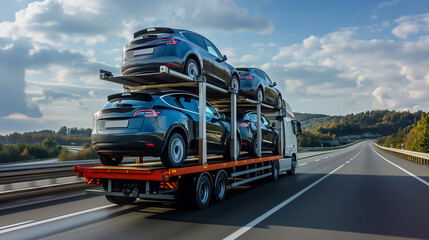Whether due to mechanical failure or an accident, many drivers need a tow. Understanding your vehicle’s weight limits and Western Towing capacities can help you avoid expensive damages to your car and trailer.
Using more than your truck’s capacity puts excessive stress on your engine, suspension, and brakes. It also reduces your vehicle’s longevity and performance.
Regardless of the type of cargo or trailer you’re hauling, it’s essential to know your vehicle’s towing capability. This is not determined by one single figure, but rather an intricate relationship between several key factors. As a driver, it’s important to understand these basics so you can avoid overloading your vehicle, ensuring that you and those in the back of your trailer are safe.
Generally speaking, full-size pickup trucks offer the best towing capabilities. In heavy-duty configuration, these pickups can typically tow more than 20,000 pounds. However, if you’re looking for a more versatile option, many midsize pickup trucks are also capable of towing light loads when properly equipped with the appropriate towing package.
In addition to a high towing capacity, it’s vital that your vehicle is able to handle the additional load placed on the engine, transmission and brakes. That’s why the engineers who design these vehicles take into consideration the demands of towing, even from the very beginning. This means that they engineer the chassis, transmission, engine and electrical system to make sure they can withstand the additional strain of hauling a trailer behind you.
For SUVs and cars, it may require a factory or dealer-installed towing package to maximize their towing capacities. These packages can include a hitch, specialized wiring and other equipment designed to reduce the stress of towing on your vehicle’s powertrain and suspension. In the case of SUVs, these towing packages can even include features like enhanced transmission cooling and a rear differential designed to distribute more power to the drive wheels.
For those drivers seeking an affordable option that can tow light loads, consider a compact SUV. These models offer a good balance of power, maneuverability and towing ability, making them suitable for most everyday driving and weekend towing needs. The Nissan Rogue, Toyota Rav4 and Jeep Wrangler are all reliable options that can tow up to 5,000 pounds when equipped with a towing package.
Heavy-Duty Trucks
Trucks aimed at the heavy towing category are big bruisers that trade comfort and around-town maneuverability for massive hauling and towing capacities. They typically have more cargo and passenger capacity than smaller pickups, making them a good choice for work or family duties. These large vehicles have some of the highest towing ratings you’ll find in any pickup, and can often fit a trailer with ease as well.
Heavy-duty pickups are usually powered by diesel engines, which offer more torque than gas-powered units. This plays a key role in their astronomical towing ratings. The Ford F-450 Super Duty, for example, can tow up to 40,000 pounds with a gooseneck trailer. It features a standard ‘dually’ rear wheels for extra traction on tough terrain, and comes equipped with an array of driver aids to help you keep control under load.
In addition to high towing ratings, heavy-duty trucks are armed with safety features to protect you and your trailer. These include electronic stability control systems, trailer sway control and hill start assist. They also feature stouter brakes to handle the additional weight and power being applied to the vehicle.
All trucks are classified based on their gross vehicle weight rating, or GVWR. Understanding this number is crucial when choosing a vehicle that meets your needs, as different classes have different towing capabilities.
Trucks in the heavy-duty class are often used by professional drivers, so they must meet certain requirements before hitting the road. In general, any vehicle with a GVWR of more than 10,001 pounds requires a commercial driving license (CDL) to operate. Additionally, trucks that carry oversized shipments must stop at state weigh stations when required.
Even smaller pickups like the Ford Ranger are capable of towing up to 7,400 pounds with a properly-equipped trailer. However, they can be a little awkward to drive when fully loaded. This is why most buyers opt for a dedicated towing vehicle that’s designed for the task at hand. These are usually more expensive, but they can save you time and hassle in the long run by eliminating the need to switch vehicles between errands.
SUVs & Vans
Many drivers assume that only trucks can tow, but SUVs can also be great towing vehicles. In fact, some of the top towing SUVs are based on truck platforms and offer heavy-duty suspensions and improved braking capabilities that make them more suited for towing than some cars. SUVs that have towing capabilities typically feature a rear-wheel drive and can handle up to 5,000 pounds when properly equipped.
The most important factor is how you’ll use the vehicle when it isn’t towing. If you frequently transport large amounts of equipment and tools, a small van is a good option because it will be easier to maneuver through town and city streets than a large truck. In addition, most small vans have a high towing capacity for their size.
When it comes to larger vehicles, full-size SUVs are usually the way to go if you want the best towing capacity possible. The latest GM SUVs like the Tahoe and Suburban are rated up to 8,600 pounds in 12-passenger van configuration, and they can be found with powerful v8 engines that make them ideal for towing. Many older models from GM and Ford are still around and are excellent choices as well.
For something a little more sporty, the Seat Ateca is a fun-to-drive SUV that can tow up to 7,800 pounds when properly equipped. Its firm suspension, which is designed for a sporty driving experience when unladen, helps keep both the vehicle and the caravan under control while towing.
Minivans are another popular choice for people looking to tow, but they’re better suited for paved roads than off-pavement trips. Many have low ground clearance, which can be a problem when you’re pulling a trailer over rough terrain. In contrast, traditional SUVs have more ground clearance and are well-suited to off-pavement travel.
In 2003, CarMax data showed that most buyers went with either a truck or a van. Over time, however, as the popularity of third-row seats dipped, van sales started to lag behind and SUVs became the more popular choice. Nevertheless, vans are still an excellent towing option and can be purchased at a competitive price.
Cars
Even smaller cars can be used to pull trailers. Small utility trailers and some small camper trailers use a standard ball hitch, which can be hooked up to many vehicles. If you want to tow a large RV or a horsebox, you’ll need a much heavier-duty trailer hitch and a gooseneck attachment.
Smaller crossovers and SUVs tend to be the most capable for towing, with some models rated at up to 3,500 pounds or more. If you’re shopping for a midsize crossover or SUV with towing capabilities, consider the Ford Edge and Nissan Murano.
The Volkswagen koda Octavia is another good choice, as it’s an excellent all-rounder and also has towing capability. This model is available in both petrol and diesel forms, as well as a 1.6-litre plug-in hybrid. If you’re shopping for a compact car with towing capabilities, the Toyota Corolla is a popular option, and the Subaru Crosstrek can tow up to 1,500 pounds.
As you move up the size ladder, most larger passenger cars and SUVs have towing capacities of 5,000 or more pounds. Larger sedans are also capable of towing, but they’ll require careful planning and some special gearing to avoid problems like engine overheating.
Some cars with towing abilities are designed for the task, such as the BMW 5 Series, which has a braked towing limit of 2,000 pounds. This model is available with a powerful V-8 that provides plenty of torque and acceleration. However, keep in mind that towing will do a number on your fuel economy, so it’s best to plan accordingly.
Unless you have a specific need for a pickup truck, the most cost-effective way to get a vehicle with towing capability is to find a used one. Some older trucks, such as the Dodge Ram 3500 dually and the GMC Sierra, have enormous towing capacities, but these vehicles will be more expensive than newer ones. If you’re willing to pay a little more for a newer, stronger and more versatile truck, there are a wide range of options from several manufacturers. These models also offer the latest safety features, including active cruise control and semi-automatic parking assistance.
